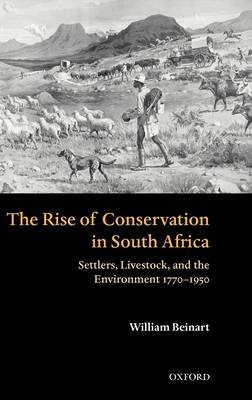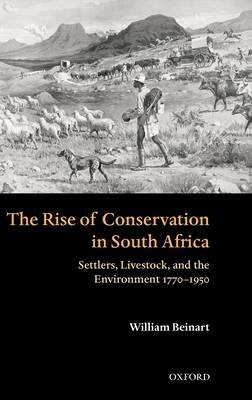
- Retrait gratuit dans votre magasin Club
- 7.000.000 titres dans notre catalogue
- Payer en toute sécurité
- Toujours un magasin près de chez vous
- Retrait gratuit dans votre magasin Club
- 7.000.0000 titres dans notre catalogue
- Payer en toute sécurité
- Toujours un magasin près de chez vous
The Rise of Conservation in South Africa
Settlers, Livestock, and the Environment 1770-1950
William Beinart
Livre relié | Anglais
451,45 €
+ 902 points
Format
Description
The Rise of Conservation in South Africa is an innovative contribution to the growing comparative field of environmental history. Beinart's major theme is the history of conservationist ideas in South Africa. He focuses largely on the livestock farming districts of the semi-arid Karoo and the neighboring eastern Cape grasslands, conquered and occupied by white settlers before the middle of the nineteenth century. The Cape, like Australia, became a major exporter of wool. Vast numbers of sheep flooded its plains and rapidly transformed its fragile natural pastures. Cattle also remained vital for ox-wagon transport and internal markets. Concerns about environmental degradation reached a crescendo in the early decades of the twentieth century, when a Dust Bowl of kinds was predicted, and formed the basis for far-reaching state intervention aimed at conserving natural resources. Soil erosion, overstocking, and water supplies stood alongside wildlife protection as the central preoccupations of South African conservationists. The book traces debates about environmental degradation in successive eras of South African history. It offers a reinterpretation of South Africa's economic development, and of aspects of the Cape colonial and South African states. It expands the understanding of English-speaking South Africans and their role both as farmers and as protagonists of conservationist ideas. The book is also a contribution to the history of science, exploring the way in which new scientific knowledge shaped environmental understanding and formed a significant element in settler intellectual life. It paints an evocative picture of the post-conquest Karoo, analyzing the impact of self-consciously progressive farmers and officials in their attempts to secure private property, curtail transhumance and kraaling, control animal diseases, enhance water supplies, eradicate jackals, destroy alien weeds such as the prickly pear, and combat drought. It concludes by analyzing conservationist interventions in the African areas, and discussing evidence for a stabilization of environmental conditions over the longer term.
Spécifications
Parties prenantes
- Auteur(s) :
- Editeur:
Contenu
- Nombre de pages :
- 452
- Langue:
- Anglais
Caractéristiques
- EAN:
- 9780199261512
- Date de parution :
- 29-01-04
- Format:
- Livre relié
- Format numérique:
- Genaaid
- Dimensions :
- 156 mm x 234 mm
- Poids :
- 811 g

Les avis
Nous publions uniquement les avis qui respectent les conditions requises. Consultez nos conditions pour les avis.






